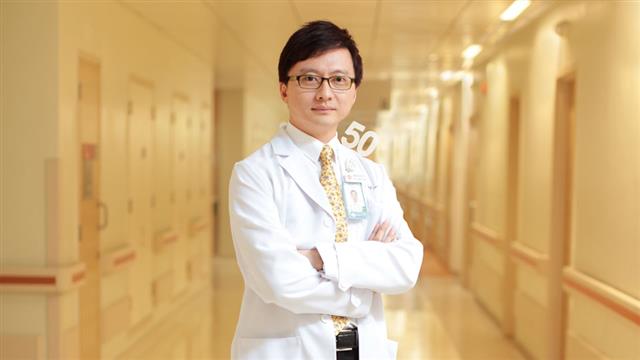You have received a number of teaching awards. What's the key to being a good teacher?
The key lies not in how you teach but whether you inspire students to engage in lifelong learning. A good teacher of medicine shows by example how to be a good doctor—how we treat our patients and their families, how we get along with our colleagues. This is crucial, especially in the clinical years when there is bedside teaching and apprenticeship.
What are the benefits of having been with CUHK for so many years as a student and teacher?
I have known the Faculty of Medicine since its establishment. I have witnessed its development so I understand its culture, strengths and weaknesses. I also understand the mindset of medical students and medical staff here. This makes my job easier.
You organized a large-scale SARS screening test for over 12,000 during 2003. Do you foresee similar arrangements for H7N9? How do you think H7N9 will affect Hong Kong and the world?
We cannot be certain how H7N9 will develop. We only know that it's transmitted from fowl to humans. So far, there's been no evidence of human-to-human transmission. The large-scale SARS screening test was conducted to look for silent carriers in the community. Unless we suspect there are silent carriers of H7N9 (and we don't as yet) [note: as at the time of interview], there will be no such screening. Throughout human history, there have been influenza outbreaks from time to time, leading to illness and death. The influenza virus is frequently transmitted by migratory birds to domestic animals, but it is not often that the virus can mutate to a form capable of crossing the human barrier, like in the case of SARS.
What has been the biggest challenge in your deanship?
I foresee many unpredictable challenges. One is the people. As dean, I want to bring this Faculty to greater heights of course. But how do I motivate people to be excellent when they already are or feel they are very good? Teamwork is certainly important.
Why did you choose to study medicine? And why digestive diseases?
I don't have tales of wanting to help people since childhood. That was not my reason. My parents always told me that being a doctor was an excellent job that would give me a high social status. So I studied hard to become a doctor, but in the process, I discovered the uniqueness of the profession. Medicine is both a science and an art—you certainly can't say that of every profession. The science part is obvious, but what makes it an art? A disease can be defined and diagnosed using scientific methods, but to treat, say, 10 people suffering from that disease, you'll need different approaches. And what approach to use is an art that cannot be determined or assessed by science. I always tell my students, 'You don't treat the disease. You treat the patient.'
I got into digestive diseases, thanks to the influence of Prof. Joseph J.Y. Sung. When I was a Year 3 medical student, he was a doctor who had only graduated a couple of years ago. I was deeply inspired by this teacher (of internal medicine) who was not only young and capable, but also extremely keen on teaching students. So though I graduated with a gold medal in surgery, I went into internal medicine. Professor Sung left Hong Kong to further his training and upon return, was asked to head the digestive division. There was hardly anyone there compared to some other specialties which had a lot of supporting staff—just two doctors, a senior medical officer, and myself (medical officer). But I chose to join this tiny division because I felt that, without the shackles of an established infrastructure, it had more potential for development. And I had no doubt that the young Dr. Sung would take us to a whole new level. In retrospect, I think I made the right choice.
How is the contemporary lifestyle affecting trends in digestive disease and hepatology research?
The effect of our increasingly Westernized diet on both has been great. In the early 1990s, colon cancer was not common, but in the last 20 years, it's become Hong Kong's second most common cause of cancer death. I foresee that it will surpass lung cancer to become the number one killer in the near future. Fatty liver, caused often by a high-fat diet, leads to cirrhosis of the liver, and ups the risk of heart disease and diabetes. In the US, it's the main cause of cirrhosis and hepatic cancer. In Hong Kong, hepatitis B is the main cause, but I predict that it'll soon be replaced by fatty liver.
Are there any mottos that you live by as a doctor?
My inaugural lecture was titled '吾生有杏' which I translated as 'My Life in Medical Education'. I feel myself lucky to be a doctor, teacher and researcher. I tell my students, 'If a researcher writes a revolutionary paper, she'll be talked about for a year, or 10 years at most. If a doctor cures a patient, she may be remembered by the patient and his family forever. But when a teacher nurtures students who go on to nurture other students, the figures are astronomical. Whatever type of doctor you become, teach someone, if only your patients.'



